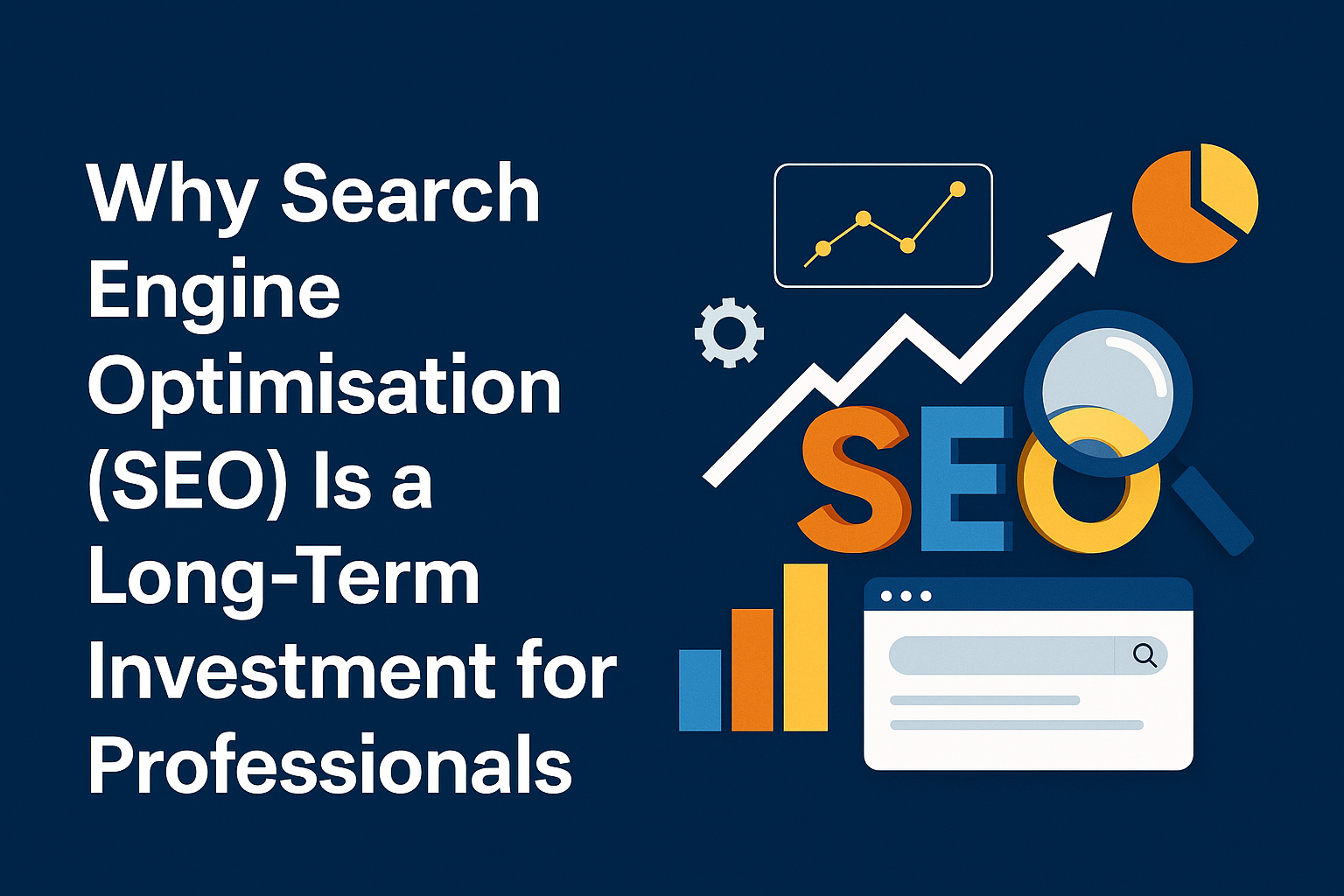
Introduction
In today’s digital‑first business landscape, professionals across industries face a crucial question: should we treat search engine optimisation (SEO) as a campaign or as a strategic investment? The answer is clear: SEO is a long‑term investment, not a one‑time fix. When done right, SEO builds enduring visibility, authority and business equity. This blog outlines why SEO makes such an investment‑worthy choice, what realistic timelines and expectations are, and how you as a professional can maximise the payoff.
1. SEO: Building Digital Real Estate That Earns Over Time
Just as you wouldn’t expect a newly planted tree to provide shade overnight, you can’t expect immediate dominance from SEO. However, over time, properly optimised content, technical structure and link authority create digital real estate: assets that continue to deliver visibility and leads. Research shows that once the momentum of SEO is established, the returns compound.
Unlike a paid ad that ends the moment you stop spending, SEO keeps working.
Key Takeaways
- Visibility generated via SEO remains as long as you maintain it.
- Content and link‑authority are cumulative assets.
- Professionals benefit because their expertise stays discoverable when people search.
2. Why the Timeline Matters: Patience + Strategy = Reward
One of the main reasons professionals hesitate is the timeframe. Many expect instant results—but SEO takes time. According to industry analysis, it can take 4–12 months or more before meaningful ranking improvements and traffic gains manifest.
The important point: your investment period must reflect long‑term horizon. Treating SEO like a short burst will likely lead to disappointment.
Practical Expectations
- Month 0‑3: Technical audits, keyword research, on‑page optimisation.
- Month 3‑6: Content creation, link‑building begins, early traffic shifts.
- Month 6‑12+: Increased rankings, growing organic traffic, stronger brand signals.
- Beyond 12 months: Compound effects, lower acquisition cost, sustained visibility.
3. SEO vs Paid Channels: Why the Long Game Wins
Paid search, display ads and social campaigns can deliver fast traffic—but stop when the budget stops. In contrast, SEO creates enduring value. Studies show SEO often outperforms paid search in long‑term ROI.
For professionals, this means that once you’ve built a solid SEO foundation, your acquisition cost per lead can drop, and you’ll depend less on high‑cost ad spend.
Comparison Snapshot
| Channel | Speed | Cost over time | Lifespan of benefit |
| Paid Search | Fast | High ongoing cost | Ends when spend ends |
| SEO | Slower | Moderate, upfront & ongoing | Continues delivering value |
4. Strengthening Brand Authority & Trust Through SEO
Search engines increasingly prioritise expertise, authoritativeness and trust (E‑A‑T). By consistently publishing high‑quality content, getting credible backlinks and delivering great user experience, professionals build authority that both search engines and human users recognise.
In turn, that authority directly influences professional reputation—and when your website ranks for your speciality, potential clients perceive you as the go‑to expert.
Why this matters for professionals
- Higher search rankings = more visibility among decision‑makers.
- Authority reduces friction in trust building – important for services and consulting.
- Long‑term SEO positions your brand ahead of competitors who drop off once campaigns end.
5. Adaptability & Future‑Proofing Your Marketing Strategy
Search engines, user behaviours and digital platforms evolve continuously: mobile, voice search, answer‑engines, AI‑driven results. A long‑term SEO approach is inherently adaptive—you’re building infrastructure that can pivot as changes occur.
For professionals, this means investing in a strategy that remains relevant—not chasing every fleeting trend.
Tip for future‑proofing
- Prioritise technical SEO foundations (site speed, mobile‑first design, structured data).
- Create evergreen content aligned to your niche expertise.
- Monitor algorithm updates and adjust while maintaining core assets.
6. How to Approach SEO Tactically as a Professional
To turn SEO into a long‑term investment, you need plan + execution + patience. Here’s how:
6.1 Audit & Benchmark
Start by understanding where you currently stand: website health, keyword visibility, content gaps.
6.2 Define Niche & Keywords
Identify the specific professional queries prospects use when searching for your services. Prioritise long‑tail keywords connected to your expertise.
6.3 Content & On‑Page Strategy
Produce content (articles, guides, case‑studies) that answers real questions your target clients ask. Optimise headers, meta descriptions, alt text and incorporate structured data for enhanced discoverability.
6.4 Technical SEO & UX
Ensure your website is fast, mobile‑friendly, secure (HTTPS), properly linked internally and easy to navigate.
6.5 Authority Building
Secure backlinks from reputable sources (industry publications, guest posts, associations). Publish your insights frequently to build thematic authority.
6.6 Measure & Optimise
Track key metrics: organic traffic, keyword rankings, conversion from organic. Adjust your strategy monthly and refine.
6.7 Commit for the Long Haul
Understand that real results often appear after many months. Keep consistent, monitor progress, and resist the urge to pull the plug early.
7. What Happens If You Treat SEO as a Short‑Term Campaign?
Treating SEO like a quick campaign tends to lead to two outcomes: minimal results and wasted investment. Without ongoing effort, rankings stagnate or drop, traffic flattens and acquisition costs rise.
For professionals, this means missed opportunities: you’ll lose out to competitors who maintain their SEO presence and your brand may appear less authoritative.
Conclusion
As a professional offering services, consultancy or specialised expertise, viewing SEO as a long‑term strategic investment rather than a short‑term fix sets you apart. By building solid foundation, creating authoritative content and committing to the journey, you reap enduring benefits: steady organic traffic, enhanced brand authority and lower acquisition cost over time. Make the investment now—so your professional presence stays visible when clients search for your expertise tomorrow.
FAQs
Q1. How long before I see results from SEO?
While it depends on niche, competition and starting point, many businesses begin to see meaningful improvements in 6‑12 months.
Q2. Can I stop doing SEO once I’m ranking well?
No — SEO isn’t “set‑and‑forget”. To maintain rankings and adapt to algorithm changes you’ll need ongoing monitoring and optimisation.
Q3. How does SEO help professionals differently than products?
Professional services often hinge on trust and authority. SEO helps you position yourself as an expert when prospects search for your niche queries, thereby enabling better lead quality and conversion.

